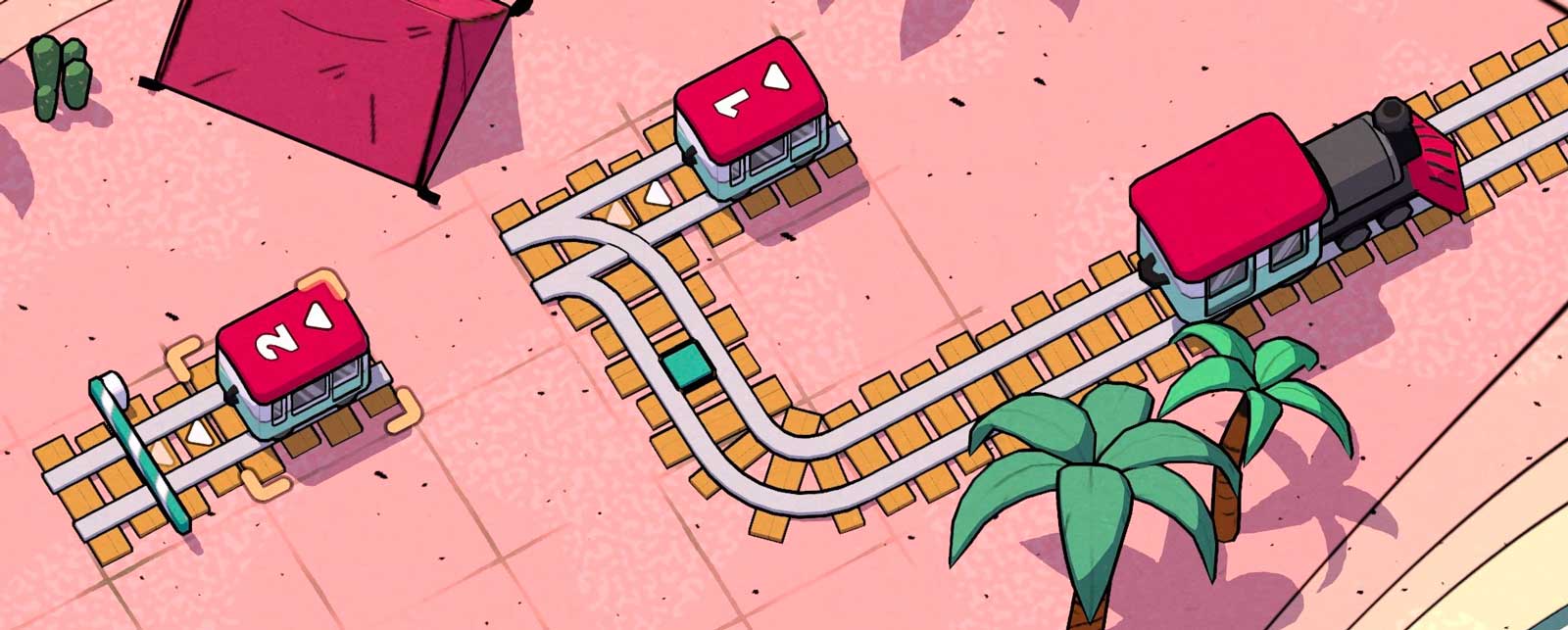People are, by our nature, resilient. We adapt to the pressures placed on us. It’s pretty incredible.
However. When we’re under pressure – mental pressure, time pressure, or otherwise – we tend to be less thoughtful. Less intentional.
Under stress, we focus on what we need to do: submit the project, feed the kid. Perhaps we find time for what we should do: answer the email, clean the counters. But under pressure, we tend to drop the things that feel… optional. Frivolous perhaps. In particular, play.

Railbound. Cozy and delightful.
Under pressure, our free time – our entertainment time, our recovery time – tends to devolve into mindlessness. You know, scrolling social media. Re-watching the same show repeatedly. Numbing and zoning out. Nobody has the energy to learn how to play Axis & Allies after working for 12 hours.
Similarly, at work, people under pressure tend to simplify. We spend less time engaging socially, having fun, and experimenting. We crack down into Serious Business Mode.
While this can be a reasonable adaptation to get through a rough patch, it’s unsustainable. As we get burnt out, it gets even harder to play, reinforcing the cycle. All work and no play makes Jack something something.
Humans need play.
Brené Brown wrote one of my favourite passages about the need for play:
When worthiness is a function of productivity, we lose the ability to pump the brakes. The idea of doing something that doesn’t add to the bottom line provokes stress and anxiety. It feels completely contrary to what we believe we want to achieve in life – we convince ourselves that downtime, like playing with our kids, hanging out with our partners, napping, tooling around in the garage, or going for a run, is a waste of precious time. Why sleep when you can work?
[Yet] play shapes our brain, fosters empathy, helps us navigate complex social groups, and is at the core of creativity… It helps our overheated brain cool down. Do not celebrate people who work through the weekend, who brag that they were tethered to their computers over Christmas break. Ultimately, it’s unsustainable behavior, and it has dangerous side effects, including burnout, depression, and anxiety – it also creates a culture of workaholic competitiveness that’s detrimental for everyone.
Dr. Stuart Brown put it more succinctly:
The opposite of play is not work – the opposite of play is depression.
When work – in all its forms – pushes out play, we slowly lose ourselves. We burn out.
All right, so we want to spend more time at play. What does that look like? The key distinction is that while entertainment is typically passive fun, play is active fun. For example:
- Sports: Team sports, solo sports
- Games: Video games, tabletop games
- Social: Having a fun discussion, joking around
- Creation: Making things for fun, hobbies
- Travel: Going for a walk just because, exploring the world
- Experiments: Trying something new, forking around to see what happens
Play can really be anything active and fun. If it feels like goofing off, that’s probably play.
It can be helpful to remember that one person’s work may be another’s play. Last year I spent hours researching and collating information about family EVs. While for most people that would just be unwelcome work, I was engaged, learning, and having fun. So for me, it was a weird form of play.
Meanwhile, something meant to be play can also devolve into work. If you’re putting hours into a game but there’s no joy in it – you’re grinding, doing the same fetch quest for hundreds of hours, but you feel like you need to keep at it – you might not be playing anymore. This is how we get those infamous reviews on Steam that say, “Not Recommended / 2,721 hours played”.

I’ve made a huge mistake.
The same thing can happen with any kind of play. Anybody who has knitted has probably started a project for fun, only for it to become a not-fun grind that you feel obligated to finish.
The point here is not to add another todo to your pile: oh great, now I need to do all my stuff, and I need to play too?! The point is that we should support ourselves and others in play. We should appreciate the value of goofing off. We should note the difference between passive entertainment and intentional play, and celebrate its place in our lives.
Play at home and work is more than just normal; it’s essential to us living our best lives. Humans need play.